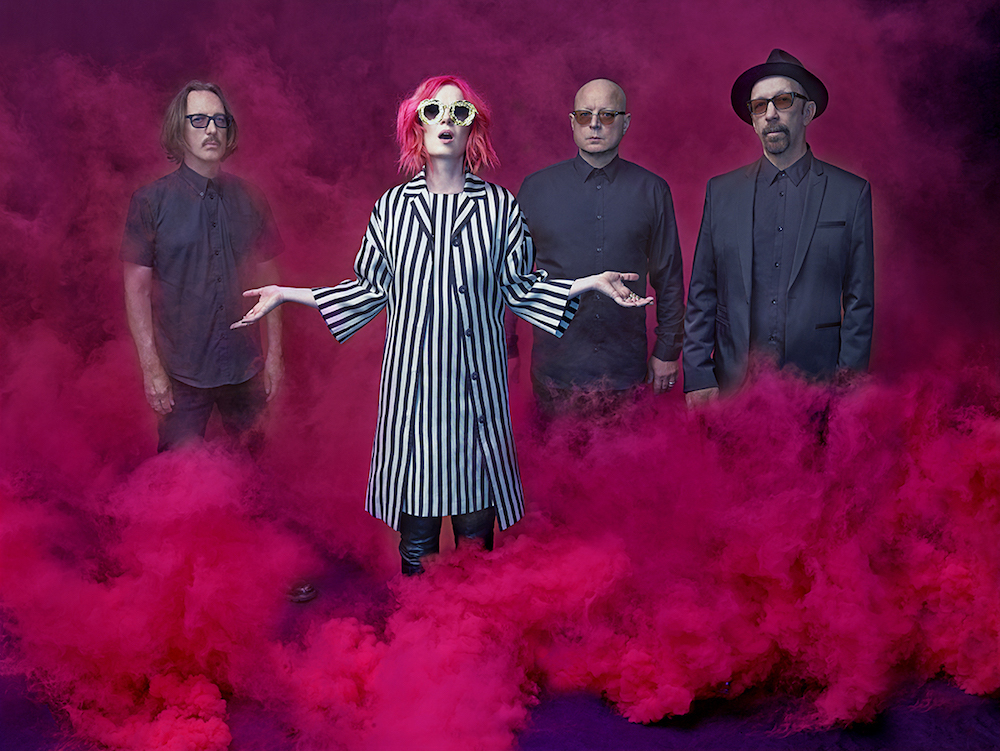“I cannot fucking believe my life.” Shirley Manson is still coming down from the high of Garbage’s Hollywood Bowl show with Blondie and Sky Ferreira when I call her in L.A. The triple-bill blowout was the fourth stop on Garbage and Blondie’s Rage and Rapture Tour, and a female-led feminist “fuck you” to the patriarchal, ageist rock world. How often do you see two women aged 50 and 72 performing to sold-out stadiums while wearing spangled capes and fishnets (Manson) and Margiela-esque bee masks (Debbie Harry)? Not frequently. “Not everyone gets to be an elder,” Manson says. “Not everyone lives that long.” She’s talking about friends who have passed on, but also maybe the fact that women’s careers often die before they hit 30.
The Rage and Rapture Tour promotes Blondie’s eleventh record, Pollinator, and Garbage’s sixth, Strange Little Birds. It also happens to coincide with the release of a Garbage coffee-table book that’s just as unconventional. This Is the Noise That Keeps Me Awake is an autobiographical compilation of memories and mementos including: unseen photographs, song lyrics, stories, and cocktail recipes that hark back to the band’s unglamorous beginnings. (One is literally just “Vodka With Anything.”) The idea behind putting a book out was really for the members of the band’s children — once they’re old enough to drink vodka, that is. “In Duke’s case, he has a grandchild, and in my case I have a niece and nephew. They’re all very young. We wanted to leave something behind for, at the risk of sounding really dark, when we die. When they grow up and actually give a shit about this kind of thing, they’ll know what it was that we did in our lives.”
How is the tour going so far?
It’s pretty amazing. We just played the Hollywood Bowl last night, which is a dream come true. It’s a beautiful old institution here in L.A. and it was a massive sold-out show. Sky Ferreira was sharing the bill with us.I met her a while ago when she sang a song I wrote. She’s got an extraordinary voice. She’s an extraordinary wee creature — immensely talented. I’ve met a lot of ingénues at this point, and Sky has something very unusual about her that you come across very rarely.
I read that your first meeting with Debbie Harry was a brief and somewhat awkward run-in in an elevator. How has your relationship evolved since then?
When I first met Debbie Harry, my first band in Scotland — Goodbye Mr. Mackenzie — was opening for her Debravation solo tour in the 80s. I was very lucky to have caught the eye of her manager at the time, Gary Kurfirst, who took an interest in me and actually ended up signing me. He really believed in me and was my mentor. I wouldn’t have had a career, really, without Debbie Harry. She taught me a lot about how to do what it is that I do in my life. She’s proven to me that it’s possible, at the age of 72, to headline a sold-out 17,000-seat venue in Los Angeles and be on the cover of a magazine. That’s an extraordinary message for all women all over the world to see, all of us who are told we lose our agency at the age of 25 when we develop our first wrinkle. Someone like Debbie Harry is saying that’s bullshit.

How has your own relationship to cameras and magazine covers changed since the 90s?
As I’ve grown older, I’ve come to realize that I can still exist doing what it is that I love with or without the media. My focus is really just on being a good artist. I try not to really think too much about whether there’s a magazine making fun of my face or my wrinkles. I just try to block it out. Although nobody particularly likes seeing something unpleasant about themselves, you can give it as much or as little power as you choose to give it. I think I’m learning now to dismiss that for exactly what it is — somebody pissing on somebody else to make themself feel better. It has very little bearing on me at the end of the day.
What was the curation process for the book like?
I got us all to go into our respective attics or basements and go through boxes of what we had accumulated over the years. It was bit of a pain in the ass, because there were a lot of things that we were not allowed to put in the book, for either legal or financial reasons. Not all record labels gave us the rights to use our own record covers and press photos. It was very frustrating, but that’s life, and you get over it and move on.
What was the coolest thing you found, personally, while going through all this physical history?
A photograph of me on stage the night that we played the opening of the Scottish Parliament. Scotland got its own parliament for the first time in nearly 300 years, and we as a band were invited to play the opening ceremony. I’m on stage at Princes Street Gardens in Edinburgh and I’m looking out over the crowd and I’m wrapped in a Scottish flag. As cheesy and kind of hokey as that is, it was still an extraordinary honor to be invited by your own country to open the first parliament in 300 years. I could burst out crying just thinking about it right now. It was a glorious summer evening, and it just felt like magic.
What can you tell us about Garbage’s new song “No Horses” (out July 14)?
We open each show with “No Horses” and every night when we step on stage I get so excited. We get this incredible reaction to it because I think we’ve touched on something that other people are feeling. It’s pretty freeform for us. It’s less structured than anything we’ve ever done before. It’s basically a dark imagining of where our world could head if we’re not vigilant. It’s an imagining of a dystopian future where a regime that’s in place destroys anything that doesn’t make money and doesn’t make profit. I feel like we’re getting closer and closer to that now, in our culture, where everything is valued by how much money it makes. To me, that’s not the value of anything.
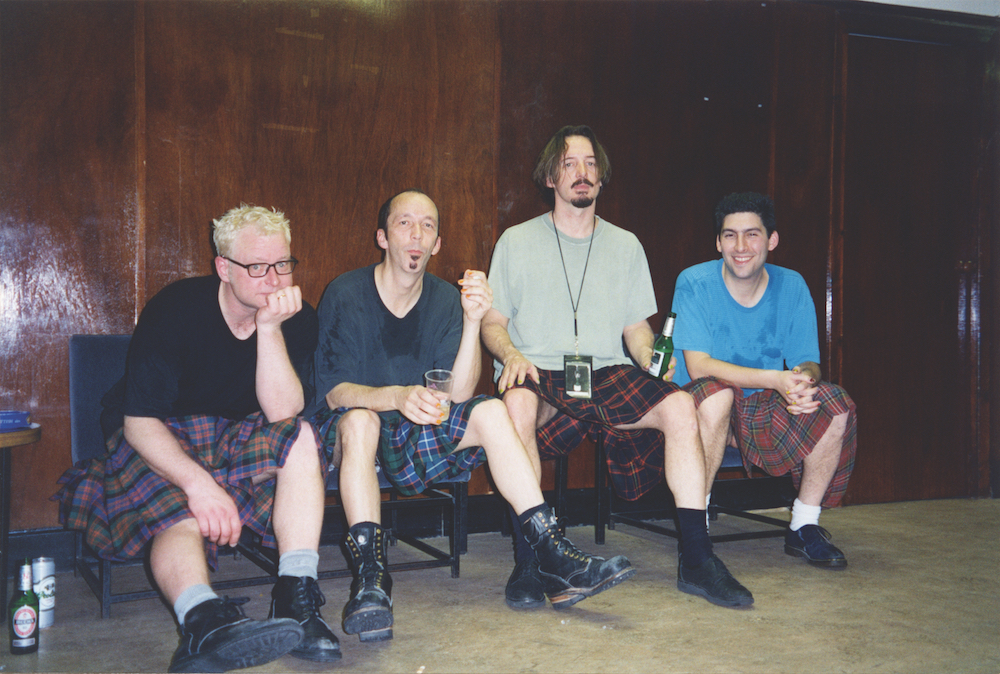
“That was the first time Garbage ever played in Scotland. It felt like bringing your prospective husband home to the family. We were on the cusp of success and we were all incredibly excited — me in particular, obviously, because I was bringing them to the Barrowland, which is arguably my most favorite venue in the world to play. We wanted to do something special because it was my home country, and all the boys in the band wanted to wear kilts. I had said, “Be warned. The Scottish audience is amazing,” and the band was like, ‘Yeah, yeah,’ thinking I was just trying to talk up my home country. We stepped on stage and the crowd went absolutely beserk. We still talk about it to this day — the floor was bouncing. It felt like we were going to get tossed off the stage from the vibrations of the crowd. “
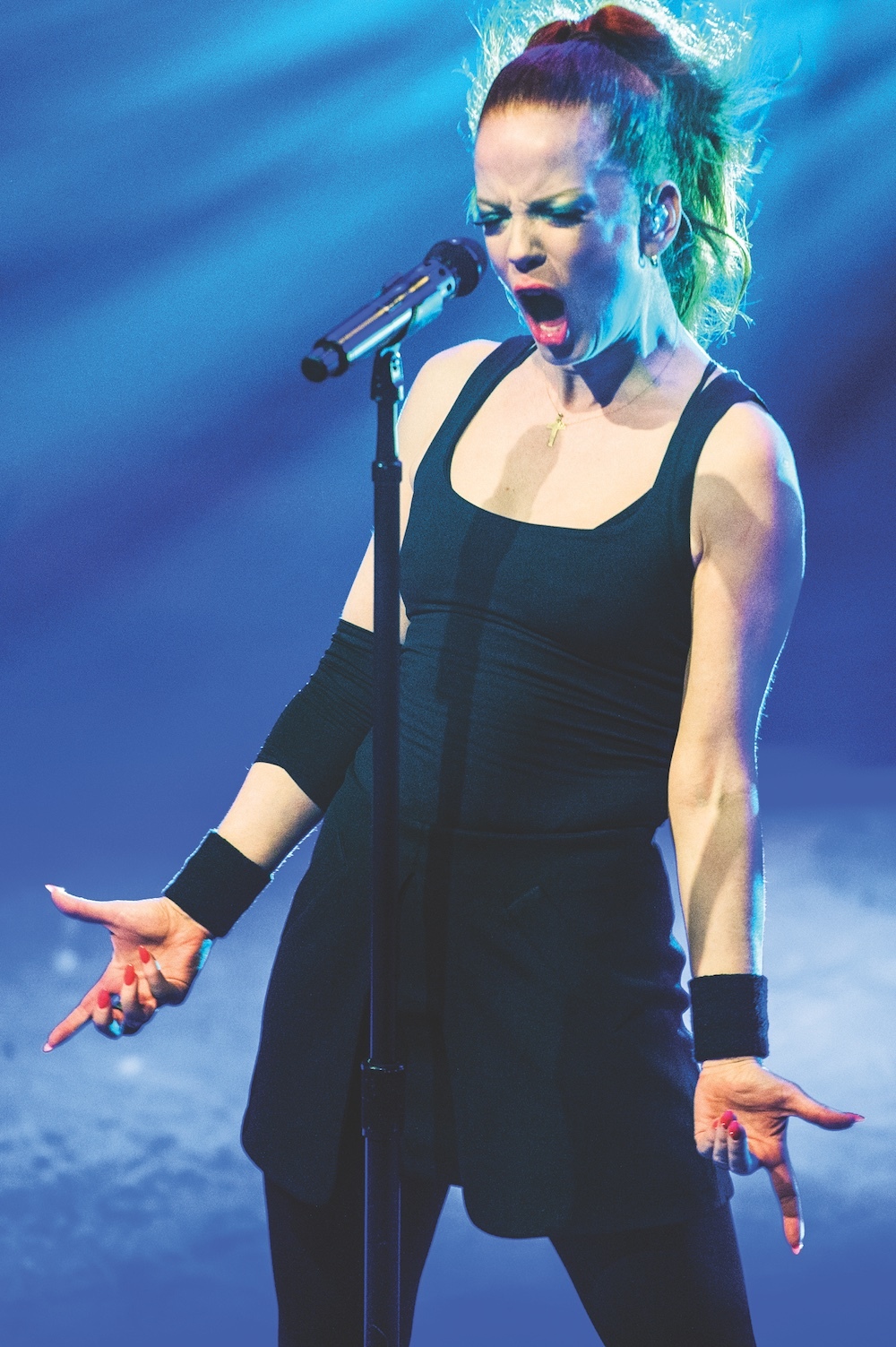
“That was a photograph from our so-called comeback tour, in that we had gone on hiatus for a lot of different reasons. We initially intended the hiatus to last about a year, and it turned into five years. During that time a lot of things happened — I lost my mom, I watched my friends lose their six-year-old kid to cancer, and one of my best friends lost her young husband. Then we came back together and went on tour. We didn’t think anyone would give a shit, and we were really taken aback by the fact that people were still there for us and still interested in hearing what we had to say. Something changed in me at that point. I just felt like I wanted to approach playing and approach making music in a different way than I had in the past. I felt like Dana really captured the metamorphosis in me — when I stopped giving a fuck about people thought of me and how they looked at me.”
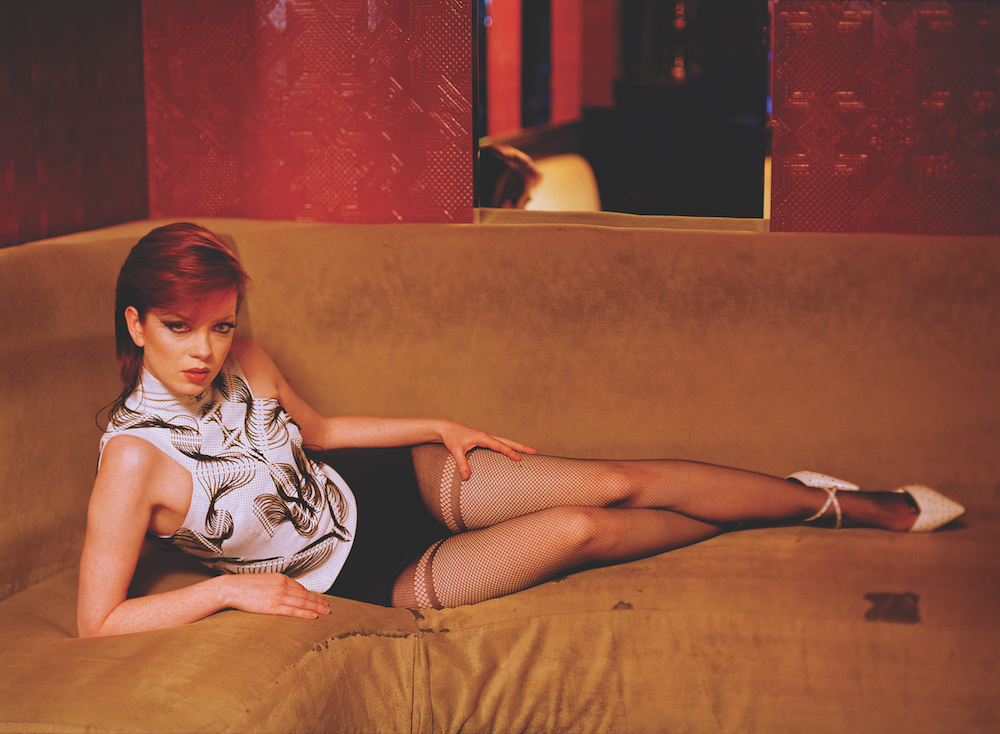
“I look at that photograph and I’m shocked by how beautiful it is. It’s super hot. I’m like, ‘Wow, I looked like that?’ When you’re a young woman and you’re at the height of your beauty and your sexual vitality — for me, I was unaware of it. All I did all day long was compare myself to models in magazines, people like Debbie Harry or Kate Moss. I love that photograph because I remember the day it was taken. One of the women I was working with at the time said, “You need to lift up your thigh, because when you push your thigh down onto the sofa, it looks fat.” I lifted my thigh up and I felt a wave of shame and self-repulsion. I can see how gorgeous I am but I remember my self-hatred. It reminds me to stop — to try and be grateful of what I do have.”
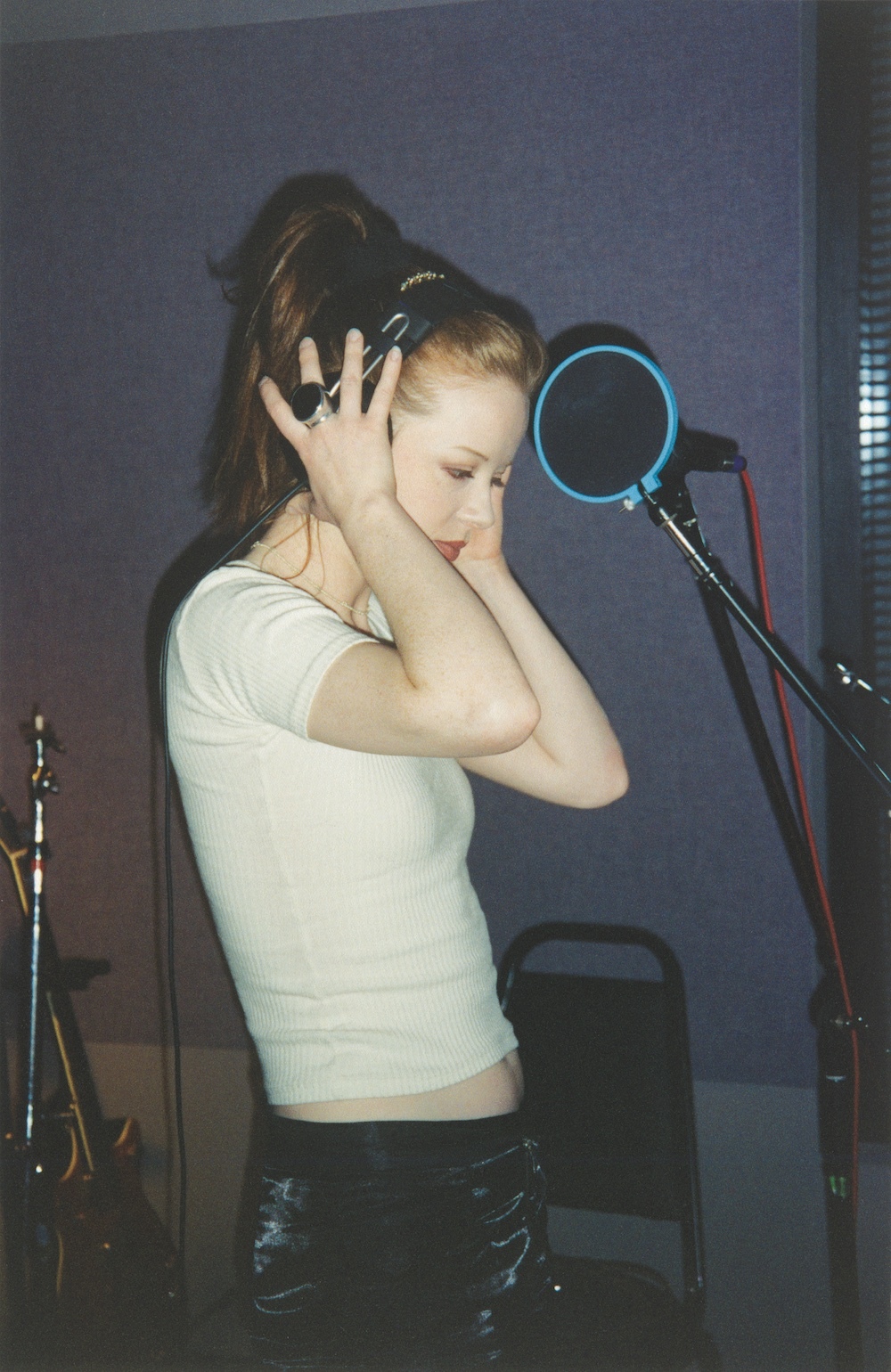
“That was during the recordings of the first record. I was concentrating so hard on what I was doing and trying to do a good job that I don’t think I was even aware of anyone taking my photograph at that point. Very rarely has anybody taken photographs of me recording. The band is uninterested so you don’t often catch me at a microphone stand in the studio. It’s a rare sighting!”
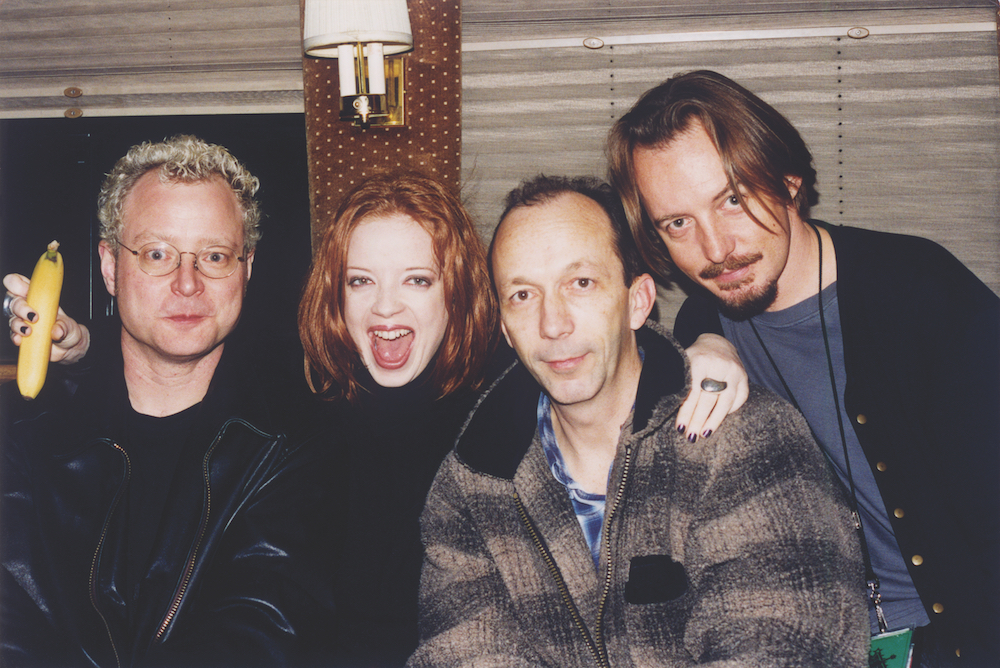
“I have no memory of why I’m holding up a banana! Other than that I always used to demonstrate objects in a phallic context. It speaks to my own immaturity as a young woman. I loved anything sexually suggestive. I loved embarrassing anyone with tits or phalluses or fannies. It was just my thing. I have to confess to still having a little bit of that. It just makes me laugh because they’re so sexualized, and I guess I like taking the power away from that.”
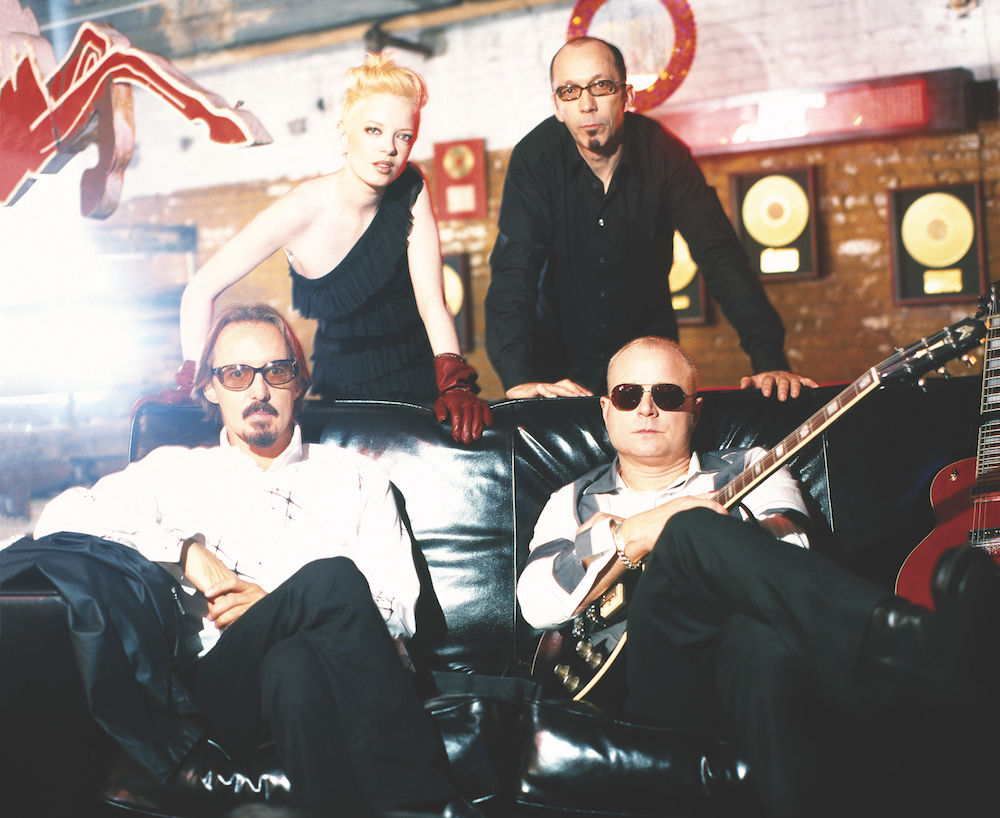
“This is a video shoot for the film Cherry Lips, which we recorded in New York. That day, Butch was practically dying from hepatitis. He had yet to be properly diagnosed. He’s got shades on because his eyes had gone completely yellow. He was really, really dangerously sick. The director said, ‘We really just need you in for a few establishing shots then we’ll have somebody stand in for you. You just need to show up for five minutes.’ God bless him, he struggled into the studio and was filmed for about five minutes then had to go home and get treated. We were on tour with U2 at the time and he was too ill to continue. That’s a photograph of a trooper, right there.”
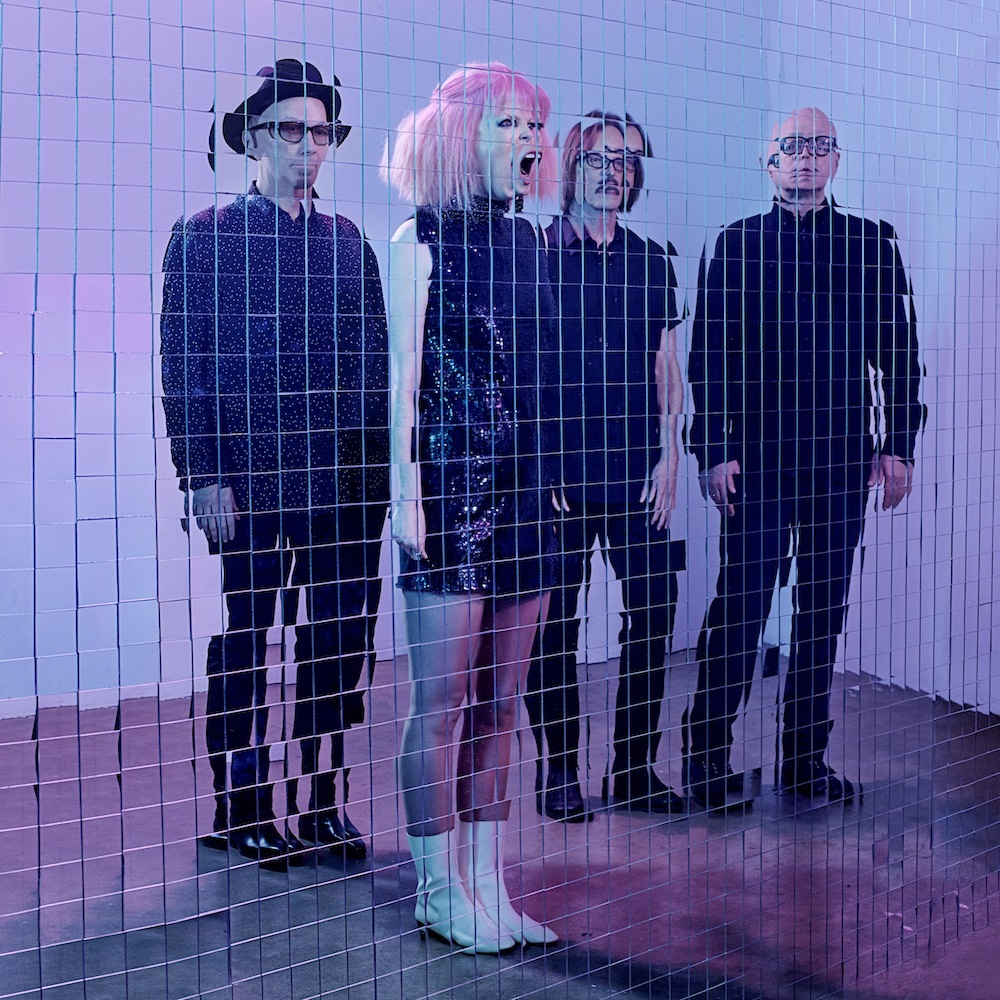
“I love this photograph because Joseph captured visually what we were trying to do musically. It’s very 90s and very much of that moment. We felt it was a little futuristic looking but also hearkened back to old rock ‘n’ roll. It’s funny that we’re now living in the future, because then we used to call ourselves sci-fi pop. We felt it was a futuristic approach to pop music. Which, now, is laughable. It’s not futuristic at all. But back then it was forward-thinking. We took elements from all genres of music — classical clarinet, samples, hip-hop beats, rock guitars, electronica. We got a lot of flack for it at the time. People were very suspicious of us. Now it’s not the future any more. All musicians are merging genres. The rules have all been broken, which is fantastic.”
Credits
Text Hannah Ongley
